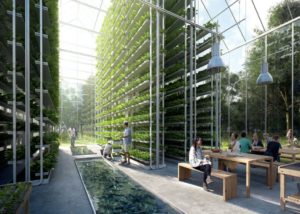In a world faced with the challenges of climate change, population growth, and diminishing agricultural land, the need for innovative solutions in food production has never been more critical. One such solution that is gaining momentum and changing the game in agriculture is vertical farming.

Vertical farming offers a sustainable and efficient way to grow food by utilising vertical space in controlled environments, such as skyscrapers, warehouses, or shipping containers.
Traditional agriculture, with its reliance on vast expanses of land, heavy water usage, and vulnerability to climate change, is proving to be unsustainable in the long run. Vertical farming presents a compelling alternative by maximising space and resources, reducing reliance on harmful pesticides and herbicides, and significantly decreasing water usage through advanced technologies like hydroponics and aeroponics.
One of the key advantages of vertical farming is its ability to produce food closer to urban centres, reducing the carbon footprint associated with transportation and distribution. By bringing food production directly to the consumers, vertical farms can ensure fresher, more nutritious produce while minimising food waste – a significant issue in today’s food supply chain.
Moreover, vertical farming is not limited by the constraints of traditional growing seasons or adverse weather conditions. By controlling environmental factors such as temperature, humidity, and light, vertical farms can produce high yields of crops year-round, providing a stable and reliable food supply regardless of external factors.
The impact of vertical farming goes beyond just food production – it has the potential to transform the way we think about agriculture and sustainability. By integrating technology, data analytics, and automation, vertical farms can optimise resource usage, monitor crop health in real-time, and maximise efficiency in ways that traditional farming methods cannot match.
As we look to the future of food production, vertical farming represents a paradigm shift that offers a hopeful and viable solution to the challenges facing our agricultural systems. By embracing this innovative approach, we can create a more sustainable, resilient, and secure food supply chain that meets the needs of a growing global population while protecting our planet for future generations.
In conclusion, vertical farming is not just a trend but a fundamental shift in how we cultivate and produce food. It holds the promise of revolutionising agriculture, shaping the future of food production, and paving the way towards a more sustainable and resilient food system. The time to embrace this transformation is now – let us seize the opportunity to build a better future for agriculture, our communities, and our planet.
By Olufemi Babamuboni, CEO of ToluTech Solutions, 08058984454
